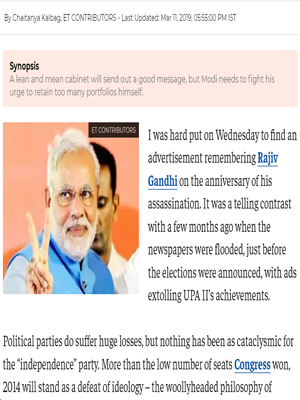The Needle’s Eye
The meaning of absolute power
Published date: 11th Mar 2019, The Economic Times
View PDFI was hard put on Wednesday to find an advertisement remembering Rajiv Gandhi on the anniversary of his assassination. It was a telling contrast with a few months ago when the newspapers were flooded, just before the elections were announced, with ads extolling UPA II’s achievements.
Political parties do suffer huge losses, but nothing has been as cataclysmic for the “independence” party. More than the low number of seats Congress won, 2014 will stand as a defeat of ideology – the woolly-headed philosophy of spending your way to a jobless, growth-less, high-inflation, dole-based paradise of Potemkin villages around our overcrowded landscape.
For the first time, the heir of the Rashtriya Swayamsevak Sangh and the Jana Sangh has won a clear mandate. “The wave has hit the shore,” the RSS mouthpiece Organiser said. Modi’s majority ought to give him the freedom to craft a cabinet of meritorious achievers, but will he do that? The signs are not too propitious. We have already heard talk about accommodating the BJP’s electoral allies, even though this is not a coalition government.
We hear talk about old party faithfuls having to be fitted in. We also hear talk about Modi naming a relatively small cabinet, with much importance being given to bureaucrats and even non-party expertise. A lean and mean cabinet will send out a good message, but Modi needs to fight his urge to retain too many portfolios himself. He has a rare opportunity to reshape government, not just minimise it, but it cannot look like business as usual on the 26th.
Modi has shattered quite a few ceilings in his rise to power. He said in Parliament’s Central Hall that somebody from an impoverished background was standing there, thanks to our Constitution. He was modest enough not to say that he has ruled Gujarat with no opposition to speak of since 2001, and is about to do so in New Delhi. That unassailable position could yield a business-like Parliament that works, or it could hold the seeds of the BJP’s downfall if it succumbs to arrogance and autocracy.
The elections demolished the post-Mandal caste structures that had caught North India in particular, in a pincer of poverty and credulity. Caste-based groups like the Bahujan Samaj Party, the Samajwadi Party, the Rashtriya Janata Dal, and the Janata Dal (United) were wiped out.
But parochialism and ethnic chauvinism continued to rule through the strong votes for the Trinamool Congress, the AIADMK, the Biju Janata Dal, and the Shiv Sena, as well as the Andhra groupings of the Telangana Rashtra Samithi and the Telugu Desam.
The BJP swept the Hindi heartland and Gujarat, but is that really a plurality of India?
Given these trends, and the BJP’s vote share of 31 per cent, can the party be truly non-denominational, and will it be able to govern without succumbing to questionable pulls and pushes? I have my doubts, and three men who joined the party recently underline the perils of “winnability”, the colouring of our national security as well as the BJP’s wink-nudge politics.
Former Mumbai police commissioner Satyapal Singh joined the BJP two days after quitting the Indian Police Service on January 31. He had become close to the RSS when he was the Nagpur police commissioner. He also asked to be recused from the special team investigating the Ishrat Jahan fake encounter in Gujarat. R.K. Singh joined the BJP less than six months after retiring as the country’s home secretary in June 2013. You have to ask yourself whether he was non-partisan when he controlled the nation’s internal security apparatus.
Neither the police officer nor the bureaucrat could have joined the BJP on the spur of the moment. Did that mean they were political even when in service? Both men leapt past the revolving door into the BJP in indecorous haste. Both men won handily.
Former army chief General VK Singh, who retired two years ago after a huge row with the government over his birth certificate, made his political ambitions clear when he began showing up at Anna Hazare’s rallies. If that was conduct unbecoming of a four-star general, he set a new level when he joined the BJP in March this year. The general won by a margin only slightly less pulverising than Modi’s in Vadodara.
Did his election signal not just mass discontent with corruption but also disgruntlement in our armed forces? The general and the police commissioner certainly represent the politicisation of our uniformed services. And once you cross the grey line of propriety, all bets are off.







